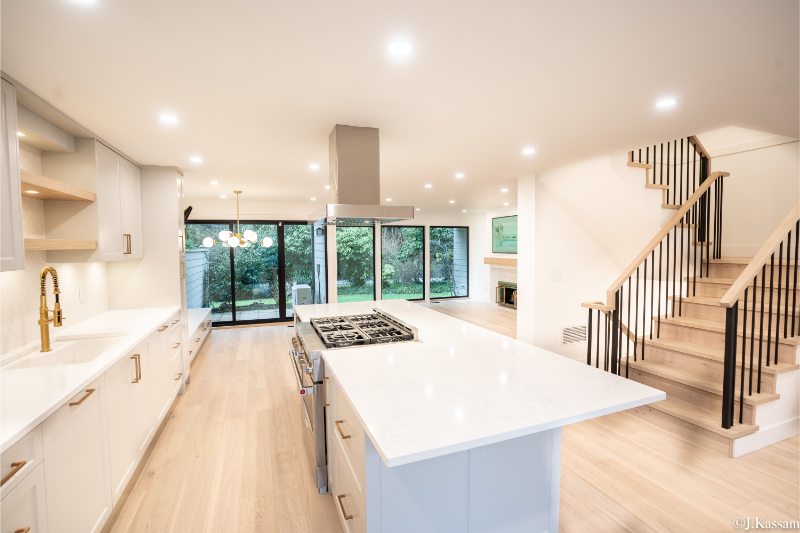We’ve all seen those movies where the main character effortlessly transforms their living space while barely breaking a sweat. But is it really that easy? The truth: Probably not. Home renovations can be exciting and scary, but should you roll up your sleeves and tackle the job yourself or enlist the expertise of a professional contractor?
Either way, your choice will affect the outcome of the renovation, in addition to your time, money spent, and the stress involved in the process. The following guide will weigh up the pros and cons of each path so you can see what will work best for you.

Contents
DIY Home Renovations
DIY or do-it-yourself projects aren’t easy, especially if you don’t have the skill set to handle what you’re looking to renovate. But, this is not to say that they’re impossible, especially with all the resources online these days. Here are some of the reasons why you might want to (or not) go the DIY route:
Benefits of DIY renovations
Cost-effective
Let’s be honest, we all love saving money where and when we can, so if you can handle your home improvement project yourself, then why not?
Flexibility in scheduling
Another great thing about DIY jobs is that the project schedule is entirely up to you. This gives you flexibility in scheduling, allowing work to progress at your own pace.
Sense of accomplishments
There’s a profound sense of accomplishment that comes with completing a DIY project. Imagine taking a step back to admire a new hardwood floor or a freshly painted wall that you did yourself. These projects can be a great opportunity to learn new skills.
Drawbacks of DIY renovations
Lack of experience and expertise
DIY home renovation jobs can often lead to mistakes if you don’t have the right skills. Plus, all the tools required and the steep learning curve that comes with them just don’t make DIY worth it.
Time-consuming
DIY projects can be incredibly time-consuming, especially if you can only commit a few hours on the weekend to them.
Risk of errors and potential safety hazards
It’s easy to feel like everything in your house is your own business but trust us, you’d probably want things like electrical wiring to be the business of a contractor. A lot can go wrong if you do it yourself, so it’s best to avoid errors altogether by hiring an expert.
Examples of suitable DIY projects
Certain home renovation projects are particularly well-suited to the DIY approach. They typically include:
Painting
A simple DIY job that can have a huge impact on your living space. The great thing about painting projects is that they can be nice socializing experiences and require very minimal specialized tools. The only thing you need to worry about is ensuring that the paint settles nicely and has a clean finish.
Installing tiles
Although this can be a little intricate, many resources, including YouTube videos and tutorials, can easily guide you through the process. But, you’re probably best steering away from this project if you’re not already accustomed to DIY upgrades or fixes.
Minor landscaping
This could be planting a garden or installing a simple water feature. If your landscaping project is a little more extensive, hiring an expert will likely be best and you might also need to ensure you have the right permits to do so.
Hiring a Professional
On the flip side, hiring a professional comes with a lot of benefits, especially if the project is quite complicated. But, professional help also isn’t without its complications:
Professional Home Renovations
Benefits of hiring a professional contractor
Experience and expertise
The greatest advantage is the level of experience and expertise that professionals bring that ensures top-quality results.

Time-saving
In addition to giving you the best results, professionals can speed up the completion of a project, mainly because they often have larger teams.
Liability insurance
Reputable contractors generally have liability insurance. This gives you an extra layer of protection against accidental damage or injuries that might occur on-site.
Drawbacks of hiring professional contractors
Higher cost
The costs are generally higher than DIY due to labor expenses.
Scheduling constraints
Homeowners may face scheduling constraints depending on the contractor’s availability.
Potential communication issues
There are always potential communication issues. Sometimes your vision for the project may not be fully realized because of misunderstandings or different expectations.
Examples of projects best suited for professional contractors
Major structural changes
You’ve probably seen videos online of untrained “professionals” running away from a collapsing wall at the last minute. Trust us, professionals don’t look like that. If you’re looking to remove load-bearing walls or add extensions to your house, let a contractor handle the job.
Plumbing and electrical work
Both of these require specialized knowledge and certifications to ensure safety and compliance with local building codes. This isn’t something you want to mess around with, as a DIY mishap here could end up costing you way more money than if you had just hired someone.
Roofing and siding installation
These are very labor-intensive jobs that, if done incorrectly, can lead to significant issues like leaks or structural damage. Again, this can end up costing you more than you bargained for if you DIY.
Making the Right Decision
As you can see, both DIY and hiring a professional have their ups and downs. So, if you’re still battling to make a decision, here’s how you can look at it…
Factors to consider when choosing between DIY and hiring professionals
- Budget
Financial constraints often determine the choice between DIY and professional help. Although doing it yourself can mean cost savings, especially if you have the necessary equipment, unexpected issues can inflate costs. Hiring a professional contractor is usually the most expensive initially but you save time and you’re guaranteed quality. - Skill level
Always assess your skills honestly. If the skills needed are beyond your know-how, it’s probably best to hire a contractor. The risk of making costly mistakes or facing physical danger simply doesn’t make DIY worth it sometimes. - Time constraints
If you’re working to a tight schedule, a professional contractor can complete the work much faster because of their experience and the size of their team. DIY projects are normally squeezed into weekends or lunch breaks, so they can drag on quite a lot. - Project complexity
Simple projects like decorating and landscaping are typically fine to do yourself, but if you’re venturing into more complex territory, just hire a professional. - Importance of proper planning and communication
With both DIY and hiring professionals, thorough planning and clear communication are vital. For DIY, this means understanding all the steps involved and preparing for a plan B. When working with contractors, you have to communicate your vision clearly to ensure you understand each other. This is where regular check-ins come in handy.

FAQs
Is DIY always cheaper?
If you can get the job done with the requisite amount of accuracy, then DIY can be cheaper. But, it’s not always cheaper. More often than not, more extensive projects require special tools that will have to be purchased. Also, with a DIY project, if you mess something up, it might cost you more money to fix it.
What is the most in-demand home improvement?
The most in-demand home improvement projects include kitchen and bathroom renovations, as these areas are key selling points for homes and impact their value.
Also, projects like energy-efficiency upgrades, such as installing solar panels, are becoming more popular. This is because of their immense cost-saving benefits and minimized environmental impact.
Outdoor improvements like landscaping, deck additions, and outdoor living spaces are also becoming sought after.
Can a hybrid approach be beneficial when it comes to home renovations?
Yes, combining your own efforts with professional services can be a useful approach. You can handle simpler tasks yourself while leaving more complex and specialized work to professionals. This hybrid approach can help you save money, learn new skills, and ensure the quality of your home renovation project.
What’s the difference between home improvement and home renovation?
Home improvement includes a wide range of projects that enhance a property, including upgrades to the interior, exterior, and overall property maintenance.
Home renovation refers to making significant changes to a property, like remodeling rooms, altering structures, or making additions to the existing layout.
What are the best practices for hiring professional contractors for home renovations?
When hiring professional contractors, follow these practices:
- Research and compare multiple contractors, considering their experience, reputation, and customer reviews.
- Obtain written estimates from at least three contractors.
- Verify the contractor’s licensing, insurance, and bonding status.
- Clearly communicate your expectations and project details, after which you should get a written contract outlining the scope.
- Communicate with the contractor throughout the project to address issues as they arise.
Final Thoughts
And there you have it – that’s our take on DIY vs hiring professionals for your home renovations.
Choosing between DIY and professional help isn’t an easy choice in many instances. But, there are a lot of times in which it is, like when you’re dealing with complex projects. Remember, be realistic when assessing your skills, budget, and the nature of the project – this will help a lot.
By carefully considering these factors, you can ensure your home renovation project is both a rewarding experience and a wise investment. When you’re ready to let a professional handle the job with precision, speed, and the utmost care, be sure to give Goldcon Construction a call.








